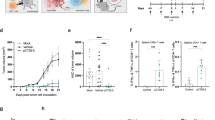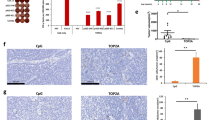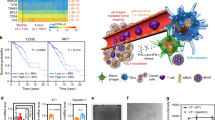Abstract
The ideal immunological target for cancer vaccine development would meet the criteria of tumor specificity, immunogenicity and vital dependency of the tumor on the functional activities of the antigenic target so as to avoid antigenic loss by mutation. Given that at face value the brother of regulator of imprinted sites (BORIS) transcription factor meets these criteria, we have developed a mutant variant of this molecule (mBORIS) that lacks tumorigenic ability, while retaining immunogenic epitopes that elicits responses against histologically irrelevant tumor cells. Here we compared vaccine strategies employing as an immunogen either mBORIS recombinant protein formulated in a strong Th1-type adjuvant, QuilA or DNA encoding this immunogen along with plasmids expressing interleukin (IL)12/IL18 molecular adjuvants. In both groups of vaccinated mice induction of tumor-specific immunity (antibody response, T-cell proliferation, cytokine production, T-cell cytotoxicity) as well as ability to inhibit growth of the aggressive breast cancer cell line and to prolong survival of vaccinated animals have been tested. We determined that DNA, but not recombinant protein vaccine, induced potent Th1-like T-cell recall responses that significantly inhibited tumor growth and prolongs the survival of vaccinated mice. These studies demonstrate that DNA immunization is superior to recombinant protein strategy and provide a clear guidance for clinical development of a cancer vaccine targeting what appears to be a universal tumor antigen.
This is a preview of subscription content, access via your institution
Access options
Subscribe to this journal
Receive 12 print issues and online access
$259.00 per year
only $21.58 per issue
Buy this article
- Purchase on Springer Link
- Instant access to full article PDF
Prices may be subject to local taxes which are calculated during checkout



Similar content being viewed by others
References
Gattinoni L, Powell Jr DJ, Rosenberg SA, Restifo NP . Adoptive immunotherapy for cancer: building on success. Nat Rev Immunol 2006; 6: 383–393.
Vieweg J, Su Z, Dahm P, Kusmartsev S . Reversal of tumor-mediated immunosuppression. Clin Cancer Res 2007; 13: 727s–732s.
Biragyn A, Tani K, Grimm MC, Weeks S, Kwak LW . Genetic fusion of chemokines to a self tumor antigen induces protective, T-cell dependent antitumor immunity. Nat Biotechnol 1999; 17: 253–258.
Kim JJ, Trivedi NN, Wilson DM, Mahalingam S, Morrison L, Tsai A et al. Molecular and immunological analysis of genetic prostate specific antigen (PSA) vaccine (published erratum appears in Oncogene 1999 Apr 8;18(14):2411). Oncogene 1998; 17: 3125–3135.
Cohen EP . Cancer therapy with DNA-based vaccines. Immunol Lett 2000; 74: 59–65.
Monzavi-Karbassi B, Hennings LJ, Artaud C, Liu T, Jousheghany F, Pashov A et al. Preclinical studies of carbohydrate mimetic peptide vaccines for breast cancer and melanoma. Vaccine 2007; 25: 3022–3031.
Monzavi-Karbassi B, Artaud C, Jousheghany F, Hennings L, Carcel-Trullols J, Shaaf S et al. Reduction of spontaneous metastases through induction of carbohydrate cross-reactive apoptotic antibodies. J Immunol 2005; 174: 7057–7065.
Petrovan RJ, Kaplan CD, Reisfeld RA, Curtiss LK . DNA vaccination against VEGF receptor 2 reduces atherosclerosis in LDL receptor-deficient mice. Arterioscler Thromb Vasc Biol 2007; 27: 1095–1100.
Kaplan CD, Kruger JA, Zhou H, Luo Y, Xiang R, Reisfeld RA . A novel DNA vaccine encoding PDGFRbeta suppresses growth and dissemination of murine colon, lung and breast carcinoma. Vaccine 2006; 24: 6994–7002.
Scanlan MJ, Simpson AJ, Old LJ . The cancer/testis genes: review, standardization, and commentary. Cancer Immun 2004; 4: 1.
Simpson AJ, Caballero OL, Jungbluth A, Chen YT, Old LJ . Cancer/testis antigens, gametogenesis and cancer. Nat Rev Cancer 2005; 5: 615–625.
Zendman AJ, Ruiter DJ, Van Muijen GN . Cancer/testis-associated genes: identification, expression profile, and putative function. J Cell Physiol 2003; 194: 272–288.
Klenova EM, Morse III HC, Ohlsson R, Lobanenkov VV . The novel BORIS+CTCF gene family is uniquely involved in the epigenetics of normal biology and cancer. Semin Cancer Biol 2002; 12: 399–414.
Loukinov DI, Pugacheva E, Vatolin S, Pack SD, Moon H, Chernukhin I et al. BORIS, a novel male germ-line-specific protein associated with epigenetic reprogramming events, shares the same 11-zinc-finger domain with CTCF, the insulator protein involved in reading imprinting marks in the soma. Proc Natl Acad Sci USA 2002; 99: 6806–6811.
Loukinov D, Ghochikyan A, Mkrtichyan M, Ichim TE, Lobanenkov VV, Cribbs DH et al. Antitumor efficacy of DNA vaccination to the epigenetically acting tumor promoting transcription factor BORIS and CD80 molecular adjuvant. J Cell Biochem 2006; 98: 1037–1043.
Vatolin S, Abdullaev Z, Pack SD, Flanagan PT, Custer M, Loukinov DI et al. Conditional expression of the CTCF-Paralogous transcriptional factor BORIS in normal cells results in demethylation and derepression of MAGE-A1 and reactivation of other cancer-testis genes. Cancer Res 2005; 65: 7751–7762.
Hong JA, Kang Y, Abdullaev Z, Flanagan PT, Pack SD, Fischette MR et al. Reciprocal binding of CTCF and BORIS to the NY-ESO-1 promoter coincides with derepression of this cancer-testis gene in lung cancer cells. Cancer Res 2005; 65: 7763–7774.
Ghochikyan A, Mkrtichyan M, Loukinov D, Mamikonyan G, Pack SD, Movsesyan N et al. Epigenetically acting tumor promoting transcription factor BORIS is widely expressed TAA inducing anti-tumor specific T cell responses. J Immunol 2007; 178: 556–573.
Wang H, Hosiawa KA, Min W, Yang J, Zhang X, Garcia B et al. Cytokines regulate the pattern of rejection and susceptibility to cyclosporine therapy in different mouse recipient strains after cardiac allografting. J Immunol 2003; 171: 3823–3836.
Mills CD, Kincaid K, Alt JM, Heilman MJ, Hill AM . M-1/M-2 macrophages and the Th1/Th2 paradigm. J Immunol 2000; 164: 6166–6173.
Miller FR, Miller BE, Heppner GH . Characterization of metastatic heterogeneity among subpopulations of a single mouse mammary tumor: heterogeneity in phenotypic stability. Invasion Metastasis 1983; 3: 22–31.
Aslakson CJ, Miller FR . Selective events in the metastatic process defined by analysis of the sequential dissemination of subpopulations of a mouse mammary tumor. Cancer Res 1992; 52: 1399–1405.
Lelekakis M, Moseley JM, Martin TJ, Hards D, Williams E, Ho P et al. A novel orthotopic model of breast cancer metastasis to bone. Clin Exp Metastasis 1999; 17: 163–170.
Pulaski BA, Ostrand-Rosenberg S . Reduction of established spontaneous mammary carcinoma metastases following immunotherapy with major histocompatibility complex class II and B7.1 cell-based tumor vaccines. Cancer Res 1998; 58: 1486–1493.
Pulaski BA, Terman DS, Khan S, Muller E, Ostrand-Rosenberg S . Cooperativity of Staphylococcal aureus enterotoxin B superantigen, major histocompatibility complex class II, and CD80 for immunotherapy of advanced spontaneous metastases in a clinically relevant postoperative mouse breast cancer model. Cancer Res 2000; 60: 2710–2715.
Prehn RT . On the nature of cancer and why anticancer vaccines don't work. Cancer Cell Int 2005; 5: 25.
Acknowledgements
This work was supported in part by NIAID intramural grant and was also supported by NIH RO1 grants AI-44809, AG-20241 and NS-050895.
Author information
Authors and Affiliations
Corresponding author
Rights and permissions
About this article
Cite this article
Mkrtichyan, M., Ghochikyan, A., Loukinov, D. et al. DNA, but not protein vaccine based on mutated BORIS antigen significantly inhibits tumor growth and prolongs the survival of mice. Gene Ther 15, 61–64 (2008). https://doi.org/10.1038/sj.gt.3303044
Received:
Revised:
Accepted:
Published:
Issue Date:
DOI: https://doi.org/10.1038/sj.gt.3303044
Keywords
This article is cited by
-
The function of brother of the regulator of imprinted sites in cancer development
Cancer Gene Therapy (2023)
-
BTApep-TAT peptide inhibits ADP-ribosylation of BORIS to induce DNA damage in cancer
Molecular Cancer (2022)
-
Immunoprotective effect of an in silico designed multiepitope cancer vaccine with BORIS cancer-testis antigen target in a murine mammary carcinoma model
Scientific Reports (2021)
-
Targeting CTCFL/BORIS for the immunotherapy of cancer
Cancer Immunology, Immunotherapy (2018)
-
Targeting TLR-4 with a novel pharmaceutical grade plant derived agonist, Immunomax®, as a therapeutic strategy for metastatic breast cancer
Journal of Translational Medicine (2014)



